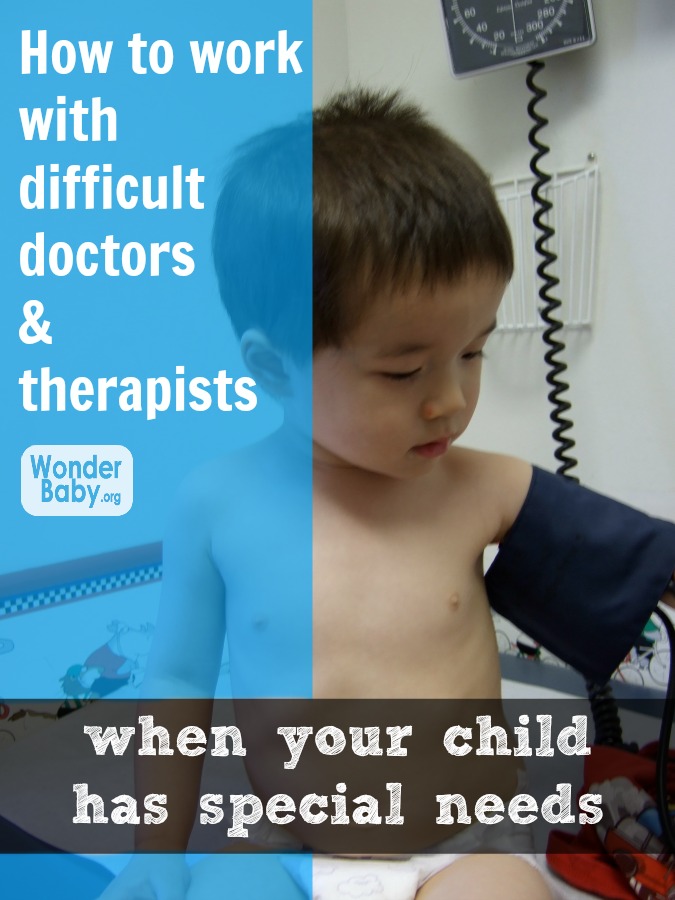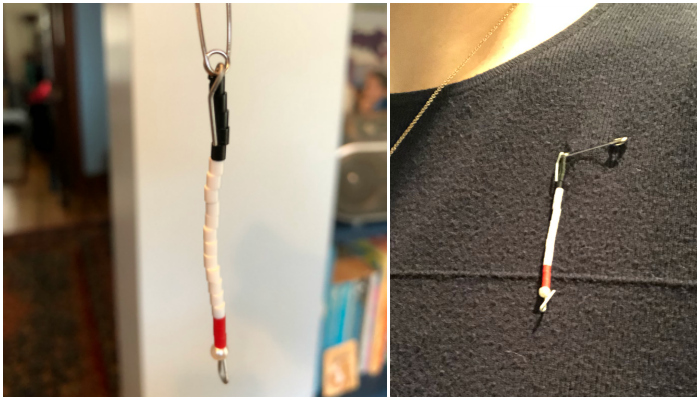How to Work with Difficult Doctors & Therapists

You thought you were having a baby. Just one, or maybe twins (or more), but still just babies. Then you realized that because your child was born with serious sight difficulties, your little bundle of joy will not be the only new arrival in your home.
No, you get the added benefit of meeting with professionals, doctors, therapists, and other assorted know-it-alls. The number of people who would like to see your child to offer assistance or advice or to inform their own interests can be astonishing. They all seem to have assistants and secretaries and everyone has an agenda.
Just take a look at this non-definitive, non-exhaustive list of Your New Best Friends:
| Pediatrician Ophthalmologist Health Visitor Special Health Visitor General Practitioner Genetic Counselor Pediatric Dietician Behavioral Specialist |
Orientation & Mobility Instructor Occupational Therapist Rehabilitation Officer Family Liaison Officer Educational Psychologist Consultant Neurologist Pediatric Neurologist |
Teacher of the Visually Impaired Speech Therapist Physical Therapist Audiologist Social Worker Pysiotherapist Music Therapist |
Whether meeting with these professionals in your home or at their office, juggling your schedule, dealing with a multitude of personalities, and still trying to come to terms with your child’s diagnosis while also focusing on simply being a good parent can be extremely overwhelming.
This is a time when you are trying to get to know this new person, making bonds to last a lifetime, dealing with post-birth trauma, baby blues (or even post partum depression), finding out about a disease process, hereditary genetic condition, or congenital defect, and, suddenly, a bunch of people invite themselves into your life to do a day’s work!
If you’re lucky, they’ll be happy, wonderful people who truly genuinely care about you and your child. If you’re very unlucky, they may have no interest in you and little real interest in your child. These doctors and therapists usually act as if they’ve seen it all before and constantly tell you of your great good fortune; They have worked with children with devastating deformities and hopeless prognoses. There is usually a subtext here: Other parents have had to adjust to much worse situations than yours and they managed to do it with a smile on their face and a song in their heart.
Don’t you believe it!
Show me the parents who behave like that and I’ll show you traumatized people who don’t understand what’s happening!
It may be your very good fortune to have the most understanding, productive, charming and well-informed therapists since Mary Poppins gave up child care, and certainly there are doctors and therapists out there who can make a positive and worthwhile addition to the care of your child, but how do you remedy a situation that can very quickly turn into a very bad experience for everyone?
Eight Tips to Working with a Difficult Doctors & Therapist
Anticipating problems before they arise is the most effective way of obviating their impact. The attitude you’re looking for is some variation on the theme of, “If I don’t know, I do know how to find out.”
This is the very best response you can encounter with professionals who are genuinely trying to make a positive difference in the life of your child. It’s non-judgmental about your thoughts or queries, the end point is informative, and everyone comes away from that conversation feeling validated. But it is not the universal response of the doctor or therapist, so what can you do to help things run more smoothly?
-
- Translate the professional language.
You may be finding that the approach used by many therapists or doctors is to treat your concerns as though they have no merit. They may not say it outright, but you know what they mean. Translating your therapist’s language and anticipating problems before they arise is an excellent way to deal with issues head on.Maybe you’ve heard this sentence in relation to one of your queries: “I have been doing this job for 20 years and no other parent has ever asked that question before.” This can perhaps be translated as… “I don’t know the answer because that’s a stupid question.”
Or maybe this is more familiar: “You worry too much.” Maybe more truthfully they mean to say… “I find your concerns trivial.”
And the comment I find most offensive: “There are hundred’s of parents dealing with this.” There’s justification in translating this as… “There’s nothing special about your child.” - Change the paradigm of the professional.
This may have been the way this professional has dealt with parents in the past, and it has worked for them. Take the time to explain that this child is the most important child they are seeing right now. Explain that you are only interested in their best effort. Remind them that your child is blind today, tomorrow, next year, and they have a professional duty to be an effective assistance to you. Make sure you and your child are seen as individuals in their eyes; it may be a new concept for some therapists but worth the time spent. - Help them to help you.
It’s in everyone’s best interests that the sessions are as effective as possible, so if you know your child needs a little time to acclimate to a new person in the room, tell the therapist to take that time. If your child has a rare genetic anomaly or an idiopathic degenerative process, write down what you know about it briefly so they can understand the current situation quickly. Some self-help sites or organizations for the support of parents of children with specific genetic syndromes even have downloadable info already tailored for the professional so make use of it where you can. - Decide what suits you.
As the parent, you are coordinating the care of your child. See therapists when it’s convenient to you and your family. Nelson Mandela has a busy schedule and a diary full of engagements. Your physio or speech therapist is not Nelson Mandela!Be prepared, of course, to wait a little longer for departments to accommodate what is convenient for you; different professionals or departments have different protocols. For example, some no longer make home visits alone. (A wise precaution if one of you happens to be an axe murderer!) - Decide your priorities.
Don’t be press-ganged into visits to doctors and therapists. Find out what they want and how they can help, and make a decision about whether you need that service or intervention right now. Educational Psychology is a terrific resource—but is Ed Psych an essential today, when your baby is three months old? Three or four hospital or therapy visits a week is not unusual for a child with sight problems—but medicalizing their childhood may not be in their best interests, either. - Give respect; Expect respect.
Therapists and doctors have training and experience that can be used to your child’s advantage. They have ongoing training, professional support bodies, and time to study. But respecting their knowledge and opinions does not have to mean ignoring your own. Of all the people involved in the care of your child, you are the one with the decision-making abilities. The right you have to make decisions on behalf of your child may not even be hinted at by professionals comfortable with habitually making decisions for other parents, but the fact remains that you are the individual with the rights and the responsibilities with regard to your child. Educate yourself, take advice, and then make the decision based on what you believe is best for your child. You, your child, your family, all of you will have to live with the decisions you are making now so don’t hand off the responsibility to someone who may not even be working with your child next month. You are the one who will have to justify these choices later—make sure they are your choices. This is not ignoring their opinions (although some therapists might wish to characterize it as that). It is taking their advice and fitting it to the life of your child and your family. - You Decide the Venue.
You decide where meetings or therapy sessions are held. This seems like such a simple thing but taking control at the outset for where you meet can mean that you don’t have to feel your home is untidy, your children unruly, and your whole day dedicated to one item. If making a venue change means that you are focused, relaxed, and firing on all cylinders you would be daft not to make the change. Meet at a school, in the hospital, at the nursery. Alternatively, if you feel that the institutional settings are too rigid and sterile for a productive meeting, have it at home, where your child is comfortable in familiar surroundings—you don’t have to be Martha Stewart to have a home fit for therapists (and they are not there to check when your windows were last washed or if your CD’s are properly alphabetized). You can even have meetings in your garden, but remember you will have to invite them into your home if the weather turns nasty! - Do not be rushed to a decision.
With the exception of emergency surgery, not many decisions cannot wait till you have had a chance to properly consider them and their consequences. Discuss them with family or a friend or your child, whatever is appropriate. Take your time and come to a decision you and your family can live happily with. Your timetable may have an entirely different rationale from that of the therapists, but yours is the important one!
- Translate the professional language.
When All Else Fails: Recuperating (or Terminating) the Relationship
It’s not the end of the world when you and your therapist disagree, but it may feel like the end of a productive relationship with this therapist or this department when you have a lack of consensus on a subject relating to your child’s health or education.
Take a deep breath and a step backwards from the situation. Can you see any merit in the advice you are being given? Have you explained your position in a rational, logical fashion? Do you feel you are being heard?
A really useful tool in this instance is the Multi-Disciplinary meeting. It is helpful to have these types of meetings periodically anyway, but during an intractable dispute it can be worthwhile for everyone to hear the opinions of the therapists’ peers in other disciplines.
You can only ever do what you believe is best for your child, but it may be an idea to reconsider your position if you are the only person who believes it has merit. It can be an advantage too, to have the therapist you are in disagreement with in the position where she has to justify her advice not just to you (you’re only the parent after all!), but to a room full of her professional peers as well.
If you do decide this meeting will be worthwhile, make certain that you are consulted about the minutes taken before they are disseminated. It is not unusual to find that the description of the meeting and your memories of the actual meeting bear little resemblance to each other and ideally the minute taker should be someone you trust, who knows the issues involved, but is not required for input at the meeting.
There are also various agencies and charities willing to provide someone who can advocate, arbitrate, and mediate for you, free of charge. This is really helpful if you feel you are not being taken seriously or that you may become too emotional, but remember it can also add a new dynamic in what may already be a fraught situation. You also have the ability to have a solicitor speak on your behalf. This should not be a first option position as it is expensive and signals to the meeting that matters have broken down, perhaps irretrievably, but perhaps this is the situation you are in, and it is certainly a solution of last resort if you can afford it.
In the event that you have a genuine grievance with someone who is expected to give essential advice on or therapy in the care of your child, do not despair. Best practice guidelines for the professionals should indicate that a change of personnel is the quickest route to a solution, whatever the reason for the breakdown in the relationship. It may be that you have a genuine inability to work with people with size 10 shoes. This is certainly a problem for you but the therapy department should have a protocol to ensure that this does not become your child’s problem (after all, he’s not the foot fascist).
Occasionally, you may find yourself working with someone you would not consider eating dinner with in other circumstances; Obviously you’re not going to love everybody. For the most part though, it should be possible to concentrate on the positive outcome for your child during these sessions, but if this person, by their behavior, attitude, or beliefs genuinely worries, offends, or frightens you, ask them to leave or you leave with your child yourself.
Contact their department head, explain what’s happened, and ask for a change in personnel. This may be the first time this has happened to you (and hopefully it’s the last; You don’t want to have a reputation for being difficult), but it’s your duty to your child’s welfare, happiness, and safety that’s paramount here and you can be assured that the department has dealt with this type of situation before.
Get over it, get past it, and get on with the work; Eventually you may even have a smile on your face and a song in your heart!

Related Posts

Advocacy, Special Needs
Advocacy Strategies for Parents of Special Needs Children
Learn about effective advocacy strategies for parents of special needs children and discover how to ensure the best possible outcomes for your child.

Advocacy, Parenting
Family vs Ableism: What I’ve Learned As a Mother of a Child with a Disability
Is it more important to be worried about how you're presenting yourself and your family to the outside world and the wider disability community, or to focus on the needs...

Advocacy, Visual Impairment
Make Your Own White Cane Lapel Pin for White Cane Day
Celebrate White Cane Day with your very own white cane lapel pin! Show your white cane pride with this hand-made bead pin.
